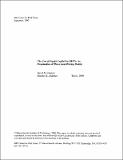The cost of equity capital for REITs : an examination of three asset-pricing models
Author(s)
Connors, David Neil, 1969-; Jackman, Matthew Laurence, 1973-
DownloadFull printable version (3.968Mb)
Alternative title
Cost of equity capital for real estate investment trusts : an examination of 3 asset-pricing models
Other Contributors
Massachusetts Institute of Technology. Dept. of Urban Studies and Planning.
Advisor
Blake Edwards and Jonathan Lewellen.
Terms of use
Metadata
Show full item recordAbstract
The purpose of this study is to determine a reliable asset-pricing model that can be used in practice to estimate the cost of equity capital for Real Estate Investment Trusts (REITs). While the cost of equity is an important concept for all industries, it has particular relevance for REITs, as the current environment has forced many REITs to explore new methods of increasing earnings. Hence, it is vital that REITs have an accurate benchmark on which to base new investment and capital budgeting decisions. The first research model employed is the traditional Capital Asset Pricing Model (CAPM). In the CAPM, the total excess returns for each REIT in the sample are regressed against the total excess returns of the broad market index. The second research model incorporates the two firmspecific factors developed by Fama and French, SMB (small minus big) and HML (high minus low). In the third model, two additional macroeconomic factors are included to represent the change in expected inflation and the change in risk premium. Using factors that are of a pervasive macroeconomic nature is in line with the Arbitrage Pricing Theory of Ross. The results indicate that the Fama-French model (FFM) is superior to the other two models in predicting excess total returns (cost of equity) for the research sample of equity REITs. This conclusion is based upon a nonparametric test comparing the fitted coefficients of determination (R 2 's) from each of the regressions. Furthermore, the range of cost of equity estimates produced by the FFM seems rational given the specific characteristics of equity REITs.
Description
Thesis (S.M.)--Massachusetts Institute of Technology, Dept. of Urban Studies and Planning, 2000. Includes bibliographical references (leaves 65-68).
Date issued
2000Department
Massachusetts Institute of Technology. Department of Urban Studies and PlanningPublisher
Massachusetts Institute of Technology
Keywords
Urban Studies and Planning.